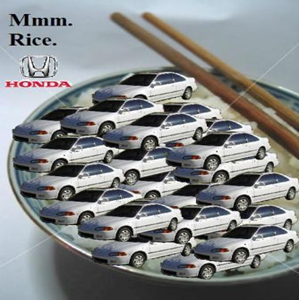I attended a drug company sponsored product safety review for NSAIDS and coxibs. These Nonsteroidal Anti-inflammatory Drugs (NSAIDS) are the tabs and caps we now and then buy over-the-counter for the quite relative symptom of pain we are experiencing. How many do not use Diclofenac, Ibuprofen, Mefenamic Acids, Meloxicam, Naproxen or Nimesulide which are a few generic of these? I'm sure only a few will assert as the rest are more familiar with their abused brand names which I will not promote here out of medical ethics. Coxibs are the rather new relatively safer yet expensive family of pain remedies. Unfamiliar still? Check your medicine cabinet for the generics. Almost constantly one of them is there.
The session, which is just one of the many dinner-preceded, drug product presentations held many times a week in my small city, is a talk less on the mechanism of formation of adverse effects of the drugs itself and more on understanding the reliability and relativity of researches done to satisfy such knowledge. The speaker started questioning everyone in the medical society how often they have been fooled by other speakers in other drug product presentations whom they rather take as surrogate markers for medical truth. He then equates the number to that of laymen who take drug commercial endorsers as surrogate markers for their idea of relief. Though only members of the medical society are present, there is no need to compute for comparison as everyone but a few, out of human vulnerability, have once or twice been fooled. Our speaker explained that we have propensity to be enthralled by the maturity, status, and enlightening background of other speakers who were suppose not to present clinical experiences but rather scientific data of which anyone who can understood can explain. Also, we almost always revere research outcome without assessing the potential inaccuracies in their methodologies especially the inclusion and exclusion of data. Several studies on side effects of pain relievers were then one by one dissected by him speaking only less ill to the generic of the brand of the sponsoring drug company. Somehow familiar then followed endorsement of their brand's generic as the best. However, certain things such as reviews on everyone's ramblings over theories on relativity which strikingly makes even the Einstein's Theory remain Relative already stuck with me.
The myth of science is its totally being true. Yes, it follows logic but not everything logical presents truth. One reason is that the nomenclature used in descriptive research once utilized for experiment can still be influenced by human biases. Take for example the symptom of pain. Evaluation of its intensity is subjected to individual conceptualization of degrees of pain. Given a range of 0 to 10 with 10 as the most painful experience one ever had in his entire life. One's idea of 5/10 may be 8/10 to you or just 3/10 to mine. Moreover, once you ask a person to characterize pain, how close is his idea of burning, cutting, pricking, tingling, stabbing, cramping, aching, throbbing, crushing, shooting, lancinating or jabbing to yours. For example, if you will use these semi-standardized data for an outstanding study, you might be adored in the scientific world but your results will remain relative to the angle of truth.
The session, which is just one of the many dinner-preceded, drug product presentations held many times a week in my small city, is a talk less on the mechanism of formation of adverse effects of the drugs itself and more on understanding the reliability and relativity of researches done to satisfy such knowledge. The speaker started questioning everyone in the medical society how often they have been fooled by other speakers in other drug product presentations whom they rather take as surrogate markers for medical truth. He then equates the number to that of laymen who take drug commercial endorsers as surrogate markers for their idea of relief. Though only members of the medical society are present, there is no need to compute for comparison as everyone but a few, out of human vulnerability, have once or twice been fooled. Our speaker explained that we have propensity to be enthralled by the maturity, status, and enlightening background of other speakers who were suppose not to present clinical experiences but rather scientific data of which anyone who can understood can explain. Also, we almost always revere research outcome without assessing the potential inaccuracies in their methodologies especially the inclusion and exclusion of data. Several studies on side effects of pain relievers were then one by one dissected by him speaking only less ill to the generic of the brand of the sponsoring drug company. Somehow familiar then followed endorsement of their brand's generic as the best. However, certain things such as reviews on everyone's ramblings over theories on relativity which strikingly makes even the Einstein's Theory remain Relative already stuck with me.
The myth of science is its totally being true. Yes, it follows logic but not everything logical presents truth. One reason is that the nomenclature used in descriptive research once utilized for experiment can still be influenced by human biases. Take for example the symptom of pain. Evaluation of its intensity is subjected to individual conceptualization of degrees of pain. Given a range of 0 to 10 with 10 as the most painful experience one ever had in his entire life. One's idea of 5/10 may be 8/10 to you or just 3/10 to mine. Moreover, once you ask a person to characterize pain, how close is his idea of burning, cutting, pricking, tingling, stabbing, cramping, aching, throbbing, crushing, shooting, lancinating or jabbing to yours. For example, if you will use these semi-standardized data for an outstanding study, you might be adored in the scientific world but your results will remain relative to the angle of truth.

Take care in devouring every ounce of information you see, hear, or read even from elaborate advance scientific researches. Currently, my group of four is trying to finish a research which is a requirement for completing our one year post graduate medical internship course. I left the review of similar studies to the finest of my scrutinizing command; however systematic they boastfully describe their techniques, to minimize the chance of having also a waste basket worth of study.
How much of science is reliable to you?







No comments:
Post a Comment